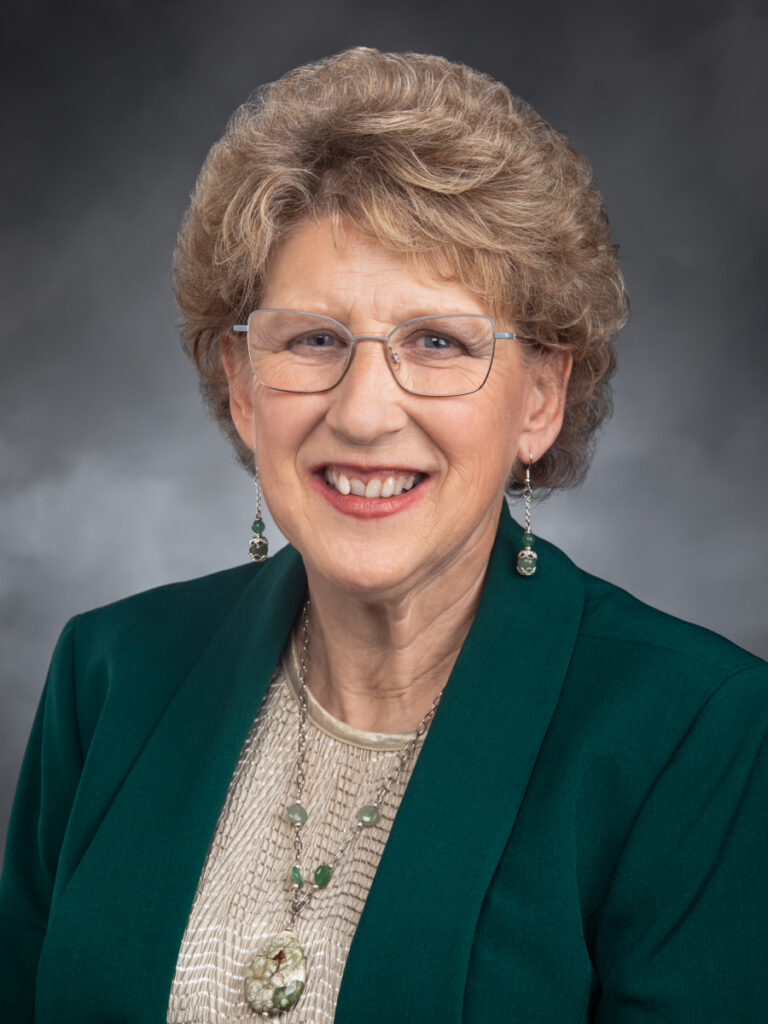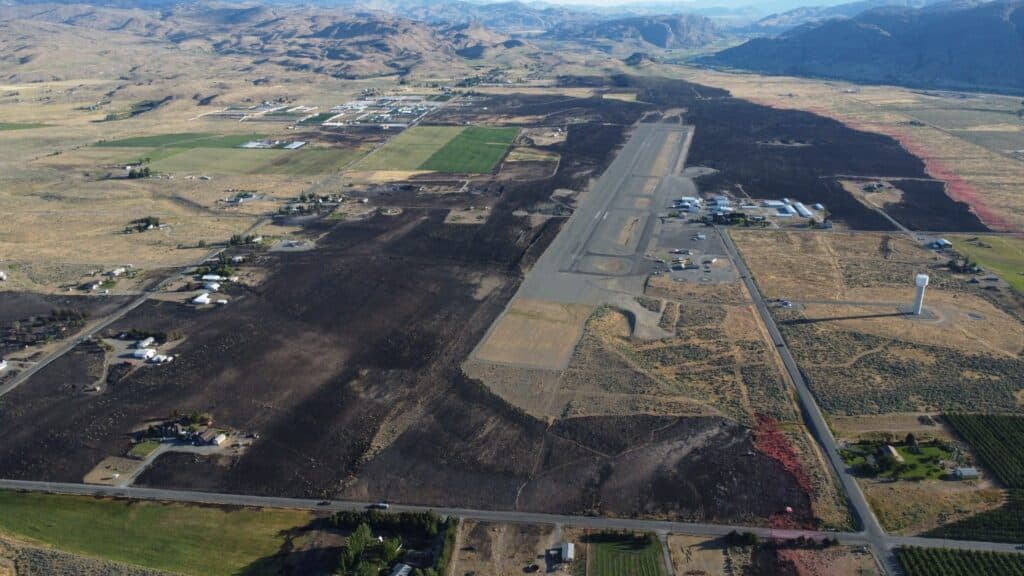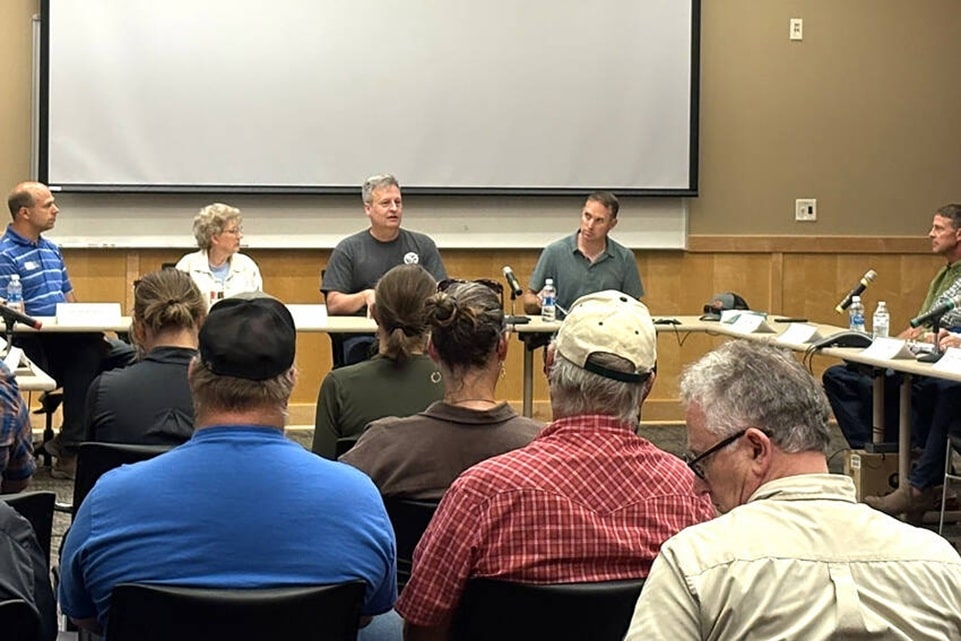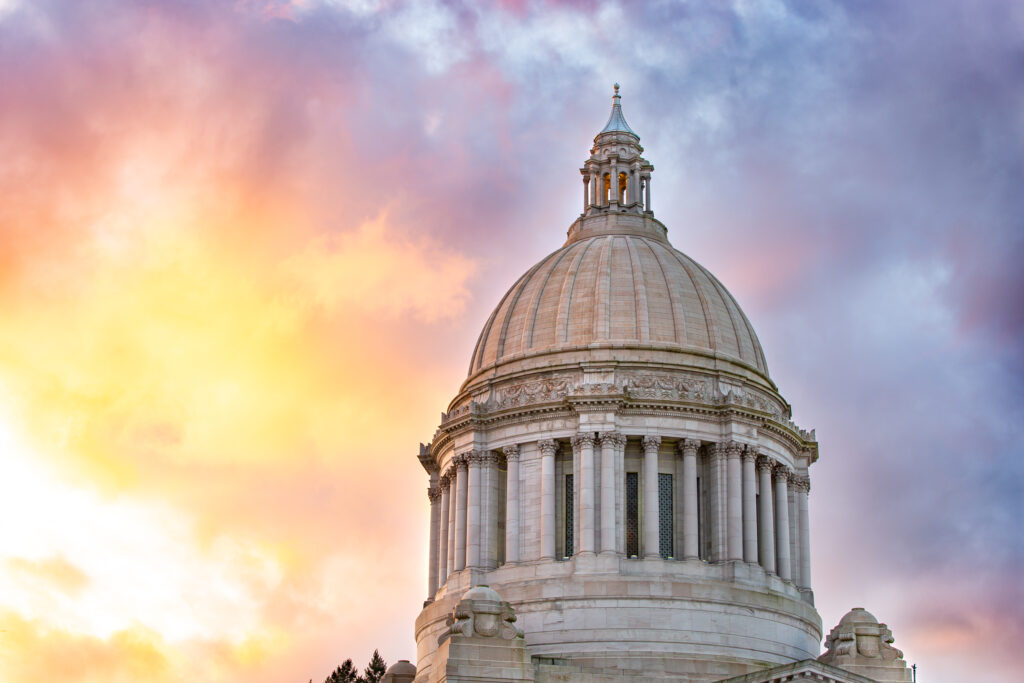A week after Lands Commissioner Dave Upthegrove visited Okanogan County to discuss wildfire-management issues, a rangeland fire broke out five miles north of Omak. The Greenacres Fire consumed more than 1,000 acres and destroyed seven homes. Photo: Okanogan County Emergency Management
Dear Friends and Neighbors,

Something tells me that many of my colleagues in the Washington Legislature may be having second thoughts right about now regarding their decision this year to cut the state wildfire budget in half. At the moment three major fires are burning in this state, two in Eastern Washington and one on the Olympic Peninsula. Several smaller fires also are burning, and firefighters are scrambling to contain them before they grow.
None of this is a surprise. Fire is what we expect this time of year, as summer heat turns our forests tinder-dry. But when smoke fills the air it certainly demonstrates the importance of an effective fire-prevention program, and reminds us of the fact that if we don’t pay up-front, we will certainly pay more later.
Upthegrove plays critical role
I’ll tell you more about this setback to our fire-prevention efforts in just a moment. But first I want to highlight the work that our new lands commissioner is doing in this important area. Democrat Dave Upthegrove is a former legislator and county councilman from the Seattle suburbs. When he was elected commissioner of public lands last year, I think many of us wondered how sensitive he would be to the needs of rural areas like ours. In recent weeks, however, he has made his leadership felt.
Upthegrove is sounding the alarm about this year’s cuts and is urging lawmakers to restore wildfire funding. At a news conference last month with Gov. Bob Ferguson near the Burdoin Fire in the Columbia River Gorge, Upthegrove declared, “If next year’s supplemental budget does not restore some of that funding, we’re going to see more fires like this, they’re going to be larger, and they’re going to cost the taxpayers a lot more money in the back end.”
Upthegrove has been repeating this message every chance he gets, in media interviews and public appearances. The people of our state’s metropolitan areas need to hear it. The commissioner’s support will be essential on this issue in the 2026 session.
A visit to Okanogan County
State Lands Commissioner Dave Upthegrove (center) visited Okanogan County July 10 and met with key local players in wildfire prevention. I joined my 7th District seatmates, Reps. Andrew Engell (left) and Hunter Abell (right) in hosting the meeting. Photo: Okanogan County PUD
A few weeks before this media splash began, Commissioner Upthegrove paid a visit to Okanogan County to see what we have been doing to combat wildfire. We followed the route of the Okanogan County PUD Loup Loup transmission line, covering lands managed by the U.S. Forest Service and the state Department of Natural Resources, and we stopped by several local projects in the Bonaparte area. We saw the difference that forest management can make, as we visited forests that survived wildfires because they were cleared of debris and treated with prescribed burns. After the tour we held a roundtable meeting on wildfire issues with representatives of the PUD, the Okanogan County Farm Bureau, city and county elected officials and the Okanogan Conservation District.
The visit showcased the important strides we have made these past few years in Washington state. It highlighted the partnerships between state and local governments, private interests and organizations that have made our work possible. And it signaled a bipartisan consensus that we need to stay the course. Now we just need to convince our city-dwelling friends.
State turns the corner on wildfire, but program in danger
With a short-sighted decision to cut wildfire funding in half, the Washington Legislature has jeopardized the significant progress we have made in fire prevention
Note: The following op-ed was published in the Cheney Free Press and associated newspapers the final week of July.
Recently those of us who live in North-Central and Northeastern Washington were reminded of the devastation wildfire can bring. As several thousand acres burned in scattered fires across our part of the state, the smoke hung over Stevens County, where I live, almost like it was 2020 again.
Except it wasn’t. It was a pale version of the agony we faced several summers ago, as wildfires dozens of times larger raged across the state, and smoke filled our skies through August and September. Have you noticed our wildfires aren’t as damaging as they used to be? We’re getting to them faster, containing them sooner, and the air isn’t nearly as bad.
This is really one of the biggest success stories ever to come from Olympia. We are turning the corner on wildfires. Let me knock on wood here – several major fires in Eastern Washington have been burning for weeks, and the worst part of fire season is yet to come. But every year since 2020 wildfire severity in this state has decreased. Some 842,000 acres burned that year. In 2024, the figure was 311,000. And for the fourth year in a row, Washington kept 95 percent of fires to 10 acres or less.
Some credit goes to Mother Nature and plain good luck. But a big part is that Washington has hit on the essential combination of policies to respond to this growing threat to our western states. I’m telling you about it here because this year’s Legislature, in its wisdom, has put this program on the chopping block. Next year it will take a special effort to save it, and it is essential we do.
House Bill 1168, the Wildfire Response, Forest Restoration and Community Resilience Act, was the Legislature’s response to our summer of smoke in 2020. It tackled the problem in a thoughtful, wide-ranging way, with an eight-year program and a funding goal of a half-billion dollars.
To fight fires, it funds larger Department of Natural Resources fire crews and puts the state air fleet on standby throughout fire season at strategic locations around the state. It pays for investments in new technologies, like infrared cameras that can detect fires at night.
It also pays for fire prevention, including thinning operations to remove overgrowth and prescribed burns to clear forest floors. By reducing flammable materials, these forest management techniques reduce the chance of crown fires that can kill entire forests. Full funding will allow DNR to complete a 20-year plan to treat 1.2 million acres, launched in 2018, in half that time.
For private landowners, grants are provided through conservation districts. By the time fire season began last year, DNR and its partners had treated 800,000 acres. We could see the result wherever fire roared through overgrown forestland, only to be stopped where prescribed burns provide a firebreak. Halfway through this program we also can assume a return in reduced firefighting costs.
So what’s the problem?
It’s that we’re backing away from the commitment. This year’s Legislature slashed funding from the promised $125 million to just $60 million for the current two-year budget cycle. Blame it on a budget crisis and a legislative leadership with other priorities. We’ll still fight fires, of course, but if we don’t restore the missing $65 million in our supplemental budget next year, our progress in fire prevention will falter. Ultimately I doubt we’ll save a dime, because fire prevention is a pay-now or pay-later affair, and paying later is always more expensive. An environmental disaster, too.
When this legislation passed in 2021, it was a bipartisan triumph, advocated by former lands commissioner Hilary Franz and sponsored by Rep. Larry Springer, both Democrats, and championed by Republican Reps. Joel Kretz and Tom Dent. Fire response, prevention and forest management should remain a concern for all of us. We need to stay the course, build on what we’ve done, and make sure those awful Augusts of a decade ago never return.
— Sen. Shelly Short, R-Addy, is floor leader for the Senate Republican Caucus.
Thanks for reading!
Sen. Shelly Short, 7th Legislative District
Contact me!
Email: Shelly.Short@leg.wa.gov
Mailing address: P.O. Box 40407/ Olympia, WA/ 98504
Website address: https://shellyshort.src.wastateleg.org/
Legislative Hotline: 1 (800) 562-6000












